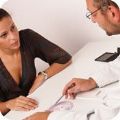|
It ranks up there with paying your taxes, going to the gym and eating your veggies—not usually enjoyable, but something you have to do for your own good While they’re not fun, certain doctor’s visits should be scheduled on an annual or semi-annual basis. "Patients are encouraged to take an active role in their How many of these appointments have you made in the past year? General Physical ExamOnce a year, both men and women should schedule a wellness checkup with their primary care physician (PCP). "During the exam, your doctor will check your medical history and ask about lifestyle behaviors like smoking, sexual health, diet and exercise," says Madrid. "Your doctor will then check your vital signs and ask if you have any health concerns." Your PCP can also help determine whether you need to see a specialist and make any recommendations. Skin CheckSkin cancer is the most common types of cancer in the United States–one in five Americans will develop the disease by age 70. A skin cancer screening is administered by a medical professional and does not require any blood work, says Madrid. "Individuals of all ethnicities can get skin cancer, so it’s important that everyone gets annual screenings to make sure their skin is in good health," he notes. Eye ExamIf you have 20/20 vision, you may be able to skip this one, says Dr. Daniel Paull, founder of Easy Orthopedics. But if you need any type of vision correction, he recommends having an optometrist look at your eyes once a year to make sure your glasses or contacts are the right prescription and that your eyes are healthy. Physical TherapistEven if you don't have any aches or pains, it can be beneficial to check with a physical therapist, notes Dr. Nicole Lombardo, P.T., D.P.T., C.S.C.S., from Back Intelligence. In addition to treating injuries, PTs are also trained to screen for muscle imbalances that could cause problems down the road. "Changes in your routine, new habits and an aging body make you move differently," explains Lombardo. "Also, there are certain postures we sit in every day for years, shaping our body into the positions we spend the most time in, like hunched over a computer or cell phone. As a result, we can develop aches, pains and injuries." Dental ExamsMeeting the recommended quota of two dental visits per year is not just good for your teeth -- it's also vital for your overall health, notes Samantha Rawdin, a prosthodontist. "Most patients know that the biannual dental checkup is necessary for spotting cavities and oral diseases," says Rawdin. "But what many don't know is that oral health has a direct connection to many systemic issues, including cardiovascular disease and diabetes, among others. Also, certain diseases can sometimes show their first signs in the mouth, and dentists are often the ones to spot them before other medical professionals." Gynecological ExamA general rule for women is to have at least one gynecological exam a year, says Dr. Nikola Djordjevic, M.D., a medical advisor for HealthCareers. This visit is essential to ensuring reproductive health and receiving preventive health screening and education. "During tests, doctors will check for the signs of STIs, vaginal infections, menstrual problems, pelvic pain, bone health and more," says Djordjevic. Annual Pap smears should begin at age 21 for women and occur every third year to check for cervical cancer, notes Madrid. Hearing TestsOne doctor's appointment that many often overlook is a hearing test. "Unfortunately, most people only think about having their hearing checked once they start noticing hearing issues," notes Jason Power, owner and managing director of The Hearing Clinic. However, the American Speech-Language-Hearing Association recommends having your hearing checked at least once every three years after the age of 50. In addition, Power says that anyone who is consistently exposed to loud noises, regardless of their age, should also schedule an annual hearing test. Breast Cancer ScreeningsIt is generally recommended that women start getting annual breast cancer screenings at age 40. "The goal of screening mammography is to detect breast cancer at an early stage when it is most treatable," Madrid explains. "According to the American College of Radiology, mammography screenings have assisted in reducing deaths due to breast cancer in the United States by [nearly one-half]." Colonoscopy TestA colonoscopy is a test used to detect abnormalities in the large intestine and rectum and remove polyps that can potentially cause colorectal cancer, Madrid says. "Colorectal cancer is the second most common cause of cancer death in the country, but it has a high five-year survival rate—90 percent—if detected early," he says. The American Cancer Society recommends that people who are "at average risk" of colorectal cancer begin getting regular screenings at age 45. Of course, this is just a sampling of some of the most commonly recommended exams. Your personal doctor’s visits will depend on factors such as your age, current health and medical history. |







.jpg)